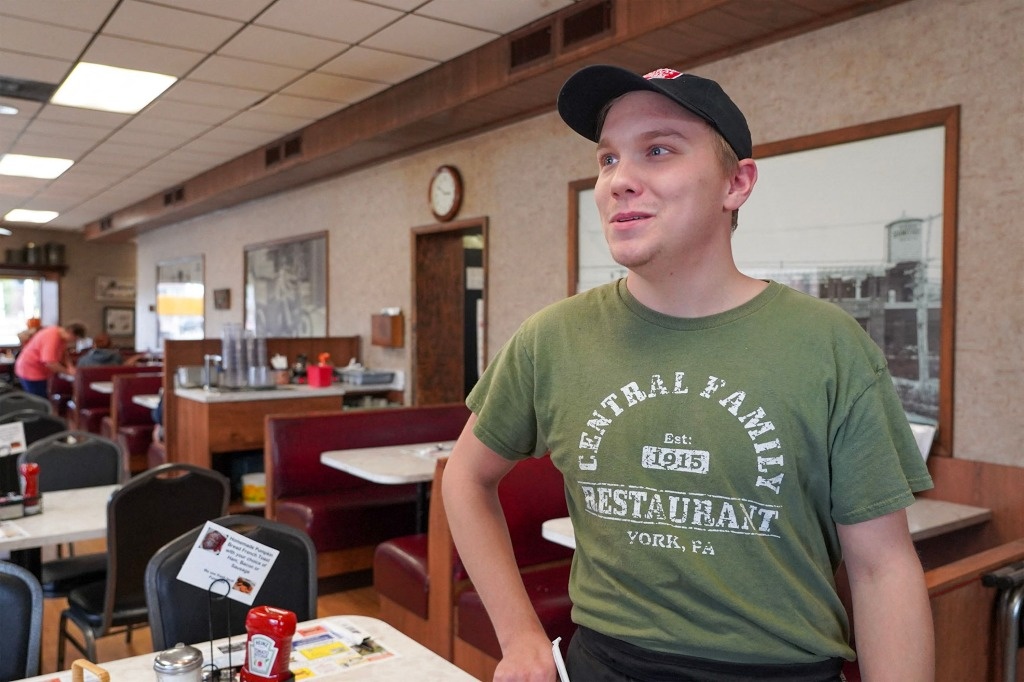York, Pennsylvania. At 21 years old, Zackree Kline works tirelessly in a funeral home and as a waiter, working about 60 hours a week to survive, a situation that motivates him to vote for Republican Donald Trump in the November presidential elections in the United States.
“I work every day of the week. I never have a day off,” Kline tells AFP in a restaurant in York, a city of 45,000 inhabitants in Pennsylvania.
This is one of the seven key states that are likely to decide the November 5 elections. Although it was once Democratic territory, the race there for the White House is very close. Aware of its importance, Trump and his Democratic rival, Kamala Harris, have repeatedly campaigned in that state in the eastern part of the country.
“I’ve had two jobs for… well, really about three and a half years,” Kline says. “Luckily, I love my two jobs, so I have no problem working so often,” he says. According to the young man, “many people” there have more than two jobs to survive.
Kline blames the rising cost of living, as the United States experienced rampant inflation following the coronavirus pandemic. He usually sleeps only five hours a night. “It has been difficult to find a balance, but you have to do what it takes to make ends meet,” he adds.
He considers himself lucky to have recently built up some savings to buy a house. “I know a lot of people are still in favor of Trump, just because everything was so much cheaper when he was president,” he says.
In fact, the conservative magnate won York County with nearly 60% of the vote in both 2016 and 2020.
“Safety net”
In August, 5.3% of American workers had multiple jobs, according to Labor Department figures.
This is equivalent to 8.5 million people, a level comparable to 2019.
In the face of inflation, “it’s not surprising that, to supplement household income, you see people go out and get a second job,” said Mike Faulkender, a finance professor at the University of Maryland.
Faulkender, a former Treasury official under the Trump administration, adds: “If it’s the result of economic stress, you would think that would bode poorly for the party currently occupying the White House.”
For high school math teacher Brianna Smith, 30, a second paycheck working 12 to 25 hours a week at a supermarket offers a “safety net.”
Teaching full-time is “doable” financially, but “sometimes I feel like I need both incomes,” she says. “Inflation, of course, made me increase more” hours, he completes.
After becoming a full professor this year, Smith hopes to soon be able to work just one job, as her students consume “a lot” of her energy. As for improving his financial situation, he doesn’t think either presidential candidate is better than the other.
a lifestyle
In the late 1990s, moonlighting rates were “much higher,” explains economist Elise Gould of the Economic Policy Institute.
For some workers like Gary Jones, this “also became part” of their “lifestyle.”
Five days a week, from 8:00 a.m. to 4:00 p.m., he maintains the facilities of a social organization in York.
Then, from 9:30 p.m. to 10:00 p.m., he works in the warehouse of a parcel delivery company.
“This is how I make extra money. You know, the way the economy is, what gasoline costs you today,” justifies this 58-year-old man.
Jones has seen inflation put small businesses out of business in recent years. “The stores that were family-owned, or the restaurants that were family-owned, no longer exist,” he says.
Although he did not want to reveal who he plans to vote for in November, he assures: “We pray that they make the right decision, that they do the right thing.”
#job #voters #ends #meet
– 2024-10-07 07:07:43
